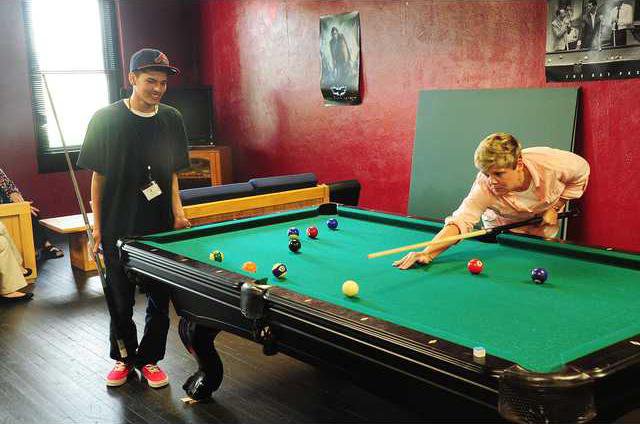When Christian Alvarado was 7 years old, he smoked marijuana for the first time.
A few years later he got "jumped" into a gang, and by the time he was 13, he was the owner of a handgun.
"I was a major pot head," said Christian, now a junior at Gainesville High School.
"I was always getting arrested. Every time, it got worse and worse."
Thanks to the Avita Community Partners’ Clubhouse, Christian has come a long way from the self-professed drug addict he used to be.
Participants are referred to the program by parents, juvenile court officials and sometimes school system employees.
Avita is a nonprofit agency founded in 1993 by the state legislature to help provide services to Georgians dealing with mental illness, developmental disabilities and addictive diseases.
The clubhouse on the Gainesville downtown square opened three years ago. Since then, more than 150 adolescents have benefited from the counseling program.
"At that time, we were selected by the (Georgia Department of Human Resources) to receive funding to start a clubhouse program for adolescents with substance abuse problems," said Betty Guilfoile, Avita regional director.
"They said they would like it to be a place where kids could come hang out and enjoy themselves in a safe, drug-free environment while also getting treatment. And that’s exactly what happens here."
"Here" is a teen-friendly center facing Bradford Street. The main floor consists of chairs and sofas for relaxing, a large flat-screen TV and a computer lab. Upstairs is a lounge area with brick-red walls, sports paraphernalia, a pool table and other games.
"Oftentimes when kids start using drugs and alcohol at a young age, they think that’s the only way to have fun," Guilfoile said.
"We help them to learn how to have fun again without those influences by providing them with a place that is fun."
‘It got to be fun’
At first, Christian says he was oblivious to the amenities in the clubhouse when he began coming in 2009. "I really didn’t want to come. My dad would drop me off in front of the building and the first few times I would just leave. One time he dragged me in and I didn’t have a choice but to stay," Christian said. "The first time I came in, I thought it was boring. It was a group (counseling session) and some guy came in to talk to us. I thought it was kinda lame and I didn’t know anybody." Despite disliking his first encounter, Christian says he kept coming and things started to improve, especially once he made friends. "It got to be fun," Christian said. One thing that helped make the experience better was the clubhouse field trips. "We’ve been to Six Flags, the water park at Lake Lanier Islands and we have an upcoming trip to the (Georgia) Aquarium," said Rachel Shiao, a clubhouse case manager. "We do all kinds of off-site activities with the kids so they can see what it’s like to do things without being high." Being drug-free fun wasn’t something Christian says crossed his mind before joining the clubhouse. "I hit my first blunt (a cigar filled with marijuana ) when I was 7. I’m from California. There are medical centers (where you can buy marijuana) on a lot of corners, so everybody smokes," Christian said. "I pretty much got into it from my cousins. They were all older than me. We all loved to have fun and that’s how we did it. "Smoking once in a while isn’t bad, but it is when you get addicted to it. That’s when you start stealing (to supply your habit) and wanting it all the time. That’s where I was. I was straight up addicted. I even hit (cocaine) a few times because my cousins in California would sprinkle it on the blunt."
A learning process
Everything at the clubhouse isn’t all fun and games. In addition to the field trips, participants also write journals and participate in group counseling sessions. "They have treatment and group sessions five days a week. We work on the (Seven Challenges Program), which is an evidence-based model for adolescent recovery," Guilfoile said. "Most of our kids participate for about six months, but it’s not a curriculum that you come in and do for a certain number of weeks. Each person is different. "It’s a process to help the kids make better decisions for themselves. They learn how to rethink their future and how drugs impact their lives." Each of the "challenges" teaches a different lesson like taking responsibility for your actions. "I’ve learned that everything takes time. They didn’t pressure me to (change overnight)," Christian said. "They gave me advice and it was up to me to take it. I guess I took it at the right time for me because now I’m in school, I’m working and I’m clean. Everything is great." One lesson that has really made a difference in Christian’s life was the one where he learned how to make thoughtful decisions. "When you get caught up doing the wrong thing, that’s your dreams down the drain. I want to be a good role model for my little sisters. Now I look ahead at the consequences," Christian said. "I think about my family and how my decisions are gonna affect them. Even if it doesn’t affect them, it affects me and I don’t want to mess up my future. "That’s how I am now."

